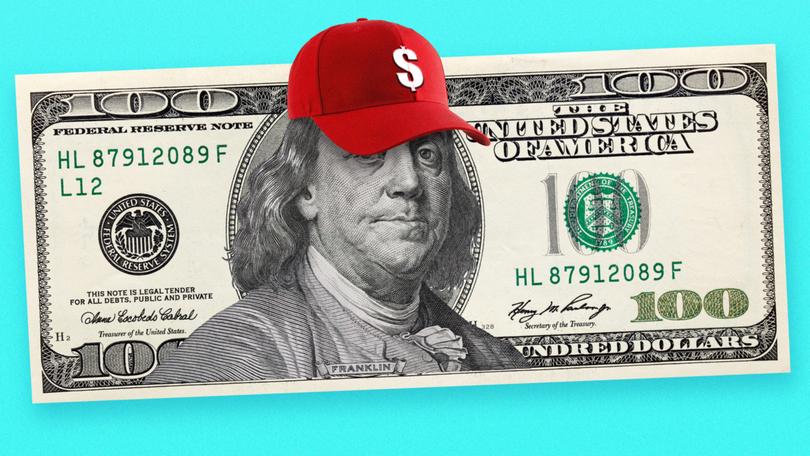Crypto, cannabis and property: How Donald Trump’s MAGA rich political players made their fortunes
The president’s new administration will be one of the wealthiest in history.

When the 24 cabinet secretaries and top-level officials in Donald Trump’s new government assemble, they will form one of the wealthiest administrations in history. Whether they are the very wealthiest is impossible to say, since official disclosures top out at “over $US50 million” ($US80m) — a pittance for some of the assembled. But such disclosures are helpful in another way: they shine a light on the widely varying investment strategies of MAGA luminaries, and thus their widely varying outlooks on the world.
For many, the lion’s share of their wealth is held in private firms. This is true of two of the richest: Howard Lutnick (Mr Trump’s nominee to be commerce secretary) and Linda McMahon (the education nominee), whose wealth is counted in the billions. Mr Lutnick is chairman of Cantor Fitzgerald, a brokerage and investment bank. Ms McMahon, whose finances are yet to be disclosed, owes most of her riches to World Wrestling Entertainment, a sports-media business. At the other end of the spectrum, Lori Chavez-DeRemer (labour nominee) owns a stake worth between US$1m and $US5m in SJJD Consulting, a recreational-cannabis producer with a licence to operate in Oregon, her home state.
Property investments are another recurring theme. Most cabinet members and would-be members are landlords; none is more enthusiastic than Doug Burgum, the secretary of the interior. In 2001 he sold Great Plains Software, a tech firm, to Microsoft for $US1.1b of the computing giant’s stock. He has since bought up swathes of land across his home state of North Dakota and neighbouring Montana, which will have appreciated nicely: house prices are on the rise in both states. He would have been better advised to keep hold of the Microsoft stock, however, which has increased in value by more than 1200 per cent since he sold his company.
Sign up to The Nightly's newsletters.
Get the first look at the digital newspaper, curated daily stories and breaking headlines delivered to your inbox.
By continuing you agree to our Terms and Privacy Policy.That is where the similarities end. The most obvious differences concern overall levels of wealth. Scott Bessent, a hedge-fund titan whom Mr Trump has selected as treasury secretary, owns art and antiques worth $US1m-$US5m, or at least five times the value of all assets reported by Marco Rubio, America’s secretary of state. Mr Bessent has holdings in stock and bond exchange-traded funds (ETFs), and hundreds of millions of dollars in bets on international currency markets. The latter is a meat-and-potatoes choice for a hedge-fund magnate, even if it would be a little adventurous for an average retail investor.
The portfolios of Jamieson Greer, Mr Trump’s nominee to be US trade representative, and John Ratcliffe, the new director of the CIA, are largely held in pedestrian stock and bond funds, bank accounts and annuities, as well as a few individual stocks. By contrast, some MAGA types have quite literally bought into the cause. Pam Bondi, the Attorney-General, holds between $US2m and $US10m in shares and warrants in Trump Media and Technology Group, which owns Truth Social, the president’s social-media network. Ms McMahon sits on the company’s board.
No single asset class better illustrates the divide between the financially conservative and the new American right than cryptocurrencies. Mr Trump now has exposure to digital assets himself through the $TRUMP meme coin he launched shortly before his inauguration. Six of the 24 cabinet secretaries and cabinet-level officials own bitcoin or other tokens, including JD Vance, the vice-president. This group is in the ascendancy both politically and financially: bitcoin has risen in price by more than 135 per cent in the past year, trouncing returns from traditional assets.
Indeed, two of Mr Trump’s most controversial nominees are big digital-asset investors. Robert F Kennedy Jr holds between $US1m and $US5m in bitcoin. Tulsi Gabbard, the nominee for director of national intelligence, is a crypto omnivore, with $US30,000-$US100,000 in bitcoin and up to $US15,000 each in cronos, ethereum and solana, three smaller coins. Although Mr Bessent reports an investment in a bitcoin ETF, it accounts for less than 0.1 per cent of his assets.
The new cabinet’s level of crypto enthusiasm outstrips that among the broader American population. According to a survey conducted by the Pew Research Centre, 15 per cent of rich American households own cryptocurrencies, with their popularity skewed to younger investors. Such an unusual level of exposure will surely buttress the administration’s support for the industry. Not only is the incoming cabinet ideologically committed to crypto — they have a huge personal stake in its success, too.
Originally published as How to invest like a MAGA bigwig
